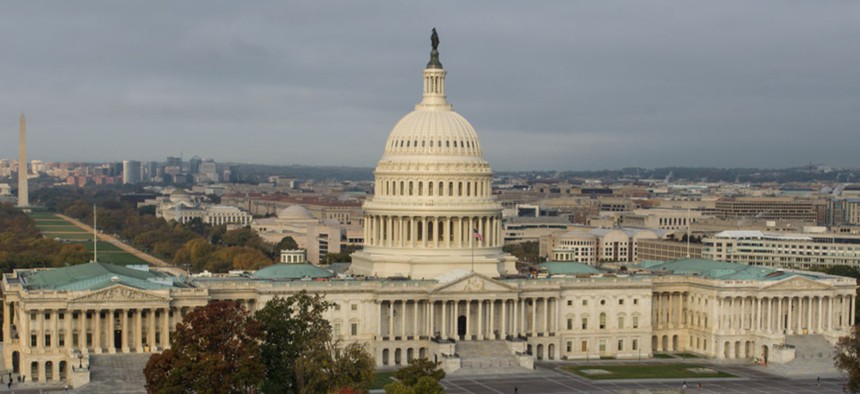
Architect of the Capitol
The Congressional War on Expertise
The Congressional Budget Office is a controversial part of the health-care debate, but that just proves its importance.
Talk about a lousy recess.
Even as members of Congress were sprinting out of town for the July 4th holiday, the hard-working nerds at the Congressional Budget Office were handed the number-crunching equivalent of a colonoscopy: Republican leadership asked them to score yet another version of the party’s ultra-toxic health-care bill. Two versions actually, one with a major amendment by Texas Senator Ted Cruz and one without.
This seems cruel even by Senate Majority Leader Mitch McConnell’s cold-blooded standards. Haven’t the CBOers suffered enough already? The high-octane health-care battle has been ruining their lives for months now. Every time Republican members send up this or that reform proposal, CBO has to break the bad news that the plan is likely to render tens of millions more Americans uninsured. (23 million? 24 million? So difficult to be precise in these situations.)
Predictably, Republicans both on Capitol Hill and at the White House have been less than thrilled by such estimates. In response, they have adopted a vigorous kill-the-messenger approach, slamming the folks at the CBO as some combination of incompetent boobs and crafty liberals looking to derail the conservative agenda.
Miffed by the agency’s initial scoring of the AHCA in March, Missouri Senator Roy Blunt derided the CBO as “notoriously bad” at predicting market outcomes. “They're sometimes not even very good at adding and subtracting,” he snarked. Health and Human Services Secretary Tom Price grumped that “the CBO report’s coverage numbers defy logic.”
White House budget director Mick Mulvaney has been even harsher, dismissing the agency’s relevance altogether. The CBO’s time “has come and gone,” Mulvaney suggested to the Washington Examiner in May, ominously noting, “You can have a government without a Congressional Budget Office.” Trump fanboy Newt Gingrich has been peddling a similar message, calling the CBO “corrupt,” “dishonest,” and “disgustingly wrong” and advocating its total abolition. (To be fair, Gingrich has loathed the agency since his days in Congress.)
All this hating on the CBO is more than a little rich, given that Republicans recruited its current chief, former Bush 43 adviser Keith Hall, just two years ago. Among those most intimately involved in the selection was then-Representative Tom Price, who gushed of Hall, “His vast understanding of economic and labor market policy will be invaluable to the work of CBO and the important role it will continue to play as Congress seeks to enact policies that support a healthy and growing economy.”
But (with props to Taylor Swift) all that mad love has turned to seriously bad blood, putting Hall and his people in a tough spot.
The CBO is supposed to stay above the political fray, serving as an independent, nonpartisan source of analysis. Both teams must be able to trust the agency’s neutrality, or its work indeed becomes worthless.
Of course, politicians being congenital whiners, the CBO takes its share of abuse. Not infrequently, the agency comes out with numbers that one or the other team dislikes. That team loudly trashes the numbers. Outrage is voiced, chests are thumped—then everybody hunkers down and the show grinds on.
But when officials start taking issue, not with a particular analysis or particular staff members, but with the agency’s very purpose, it’s time to get nervous.
Mulvaney is technically correct: You most certainly can have a government without a Congressional Budget Office. The legislative branch of that government, however, would be even less equipped to deal with data and complex analyses than it currently is. Which is saying a lot, given that lawmakers have been chipping away at their own institution’s capacity for decades.
Everyone loves to bash Big Government. Small wonder then that funding for a range of congressional support services has been slashed since the 1970s. Committee budgets have been cut, meaning staffs are smaller—and smart staffers decamp for more lucrative gigs the second they have an ounce of experience. As for support offices, the Brookings Institution notes that “the Congressional Research Service, the Government Accountability Office, and the Congressional Budget Office have lost 45 percent of their combined staffs from 1975 to 2015.”
In some cases, entire offices have been axed. Once upon a time, the Office of Technology Assessment provided lawmakers with scientific expertise. The Advisory Commission on Intergovernmental Relations, meanwhile, aimed to improve coordination between federal, state, and local governments. Then along came Newt Gingrich, who killed both during his reign as speaker in the mid-90s. Part of the issue was money. The Republican Revolution ushered in all manner of congressional budget-cutting in the name of fiscal responsibility and taming government. But more than that, it was about power. In his zeal to centralize authority in his office, the monomaniacal Gingrich began doing away with any person or institution on Capitol Hill with the knowledge and experience to second-guess his grand plans.
But here’s the problem with shedding the Hill’s pointy-headed know-it-alls. Without independent, nonpartisan, in-house repositories of knowledge, Congress becomes ever more dependent on outside know-it-alls. Particularly on complex policy matters (like, oh, health care reform), lawmakers must increasingly rely on research and analysis funded by lobbyists and think tanks, all of which have their own biases and agendas. This only increases the leverage that lobbyists, groups like Heritage, AEI, and the Center for American Progress, and even the executive branch have over lawmakers.
More and more, the Republican party is animated by an anti-government, anti-expertise spirit. (Exhibit A: Trump.) But in their rush to fuel this fever, lawmakers really should avoid (further) undermining their own competence and authority. Now and again, Congress might actually want to make a well-informed decision under its own intellectual steam.
And for the love of God, stop picking on those poor schlubs at the CBO. They deserve time to kick back and unwind just like everyone else.






